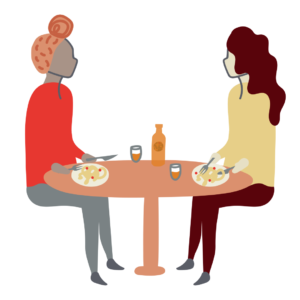We carried out different activities to develop Part I of the ‘Good Food Plan.’ Here’s a summary of the work that we’ve done over the past 6 months:

Liverpool’s Good Food Plan is co-created; we are listening to people with lived experiences of hunger and food insecurity, we are talking to staff and volunteers on the front line of food provision, and to businesses and third sector partners who understand and service our communities. We are putting people at the centre of our action plan to strengthen our food system and build resilience within the community responses to food insecurity, to ensure high-quality food provision for all.”
Paula Atherton, Policy, Partnerships & Programmes Lead (Health & Wellbeing), Liverpool Charity and Voluntary Services
We supported 48 people who have recently experienced an acute food crisis to share their stories. Working in partnership with emergency food providers, we used a Sustainable Livelihoods Approach to conduct semi-structured interviews. Feeding Liverpool also facilitated five focus groups with Liverpool city residents, including those who may have experienced mild to moderate levels of food insecurity, to learn about their experiences of food and begin the process of co-creating a vision for a Good Food City.
Watch and read the stories from residents in our city. Read a summary of the listening work and a collection of messages to people in power.
We also surveyed organisations involved in emergency food provision in Liverpool. 35 organisations responded to Feeding Liverpool’s request for information about their provision. Read the summary of findings here.
We systematically assessed peer-reviewed literature and looked at best-practice from other food alliances to collect evidence on the impact of food on health and wellbeing, to understand what makes common interventions in food systems successful, and to identify key food systems and health statistics at the Liverpool, Northwest, and national levels. We also met with experts from organisations with data related to good food in Liverpool to identify key data sources, gaps, and opportunities for data sharing. By taking a broad approach to evidence gathering, we identified key themes in developing sustainable food systems as well as gaps in our understanding of the local food system. Take a look at this catalogue and matrix of evidence-based interventions and a summary of food insecurity indicators and proxies.
We developed an interactive map that shows a number of different aspects of food insecurity within the city. This way of visualising data helps us better understand the location of different kinds of food supply and how these relate to local area conditions. It also showed us the location of food pantry and food bank users and the distance they travel to food banks and food pantries. The process of developing the map helped spot data blindspots in the system where data is currently lacking or disconnected. We are also developing an interactive map to help connect residents with community food spaces and to support Goal 3 around food citizenship.
We created collaborative spaces that brought together a wide range of expertise and experiences to begin to make sense of the impact of the Covid-19 pandemic as well as the evidence, mapping and listening work that was carried out. Through facilitated sessions that used principles of complex systems thinking, future scoping, participation and user centered design we identified priorities and set the direction of travel.


